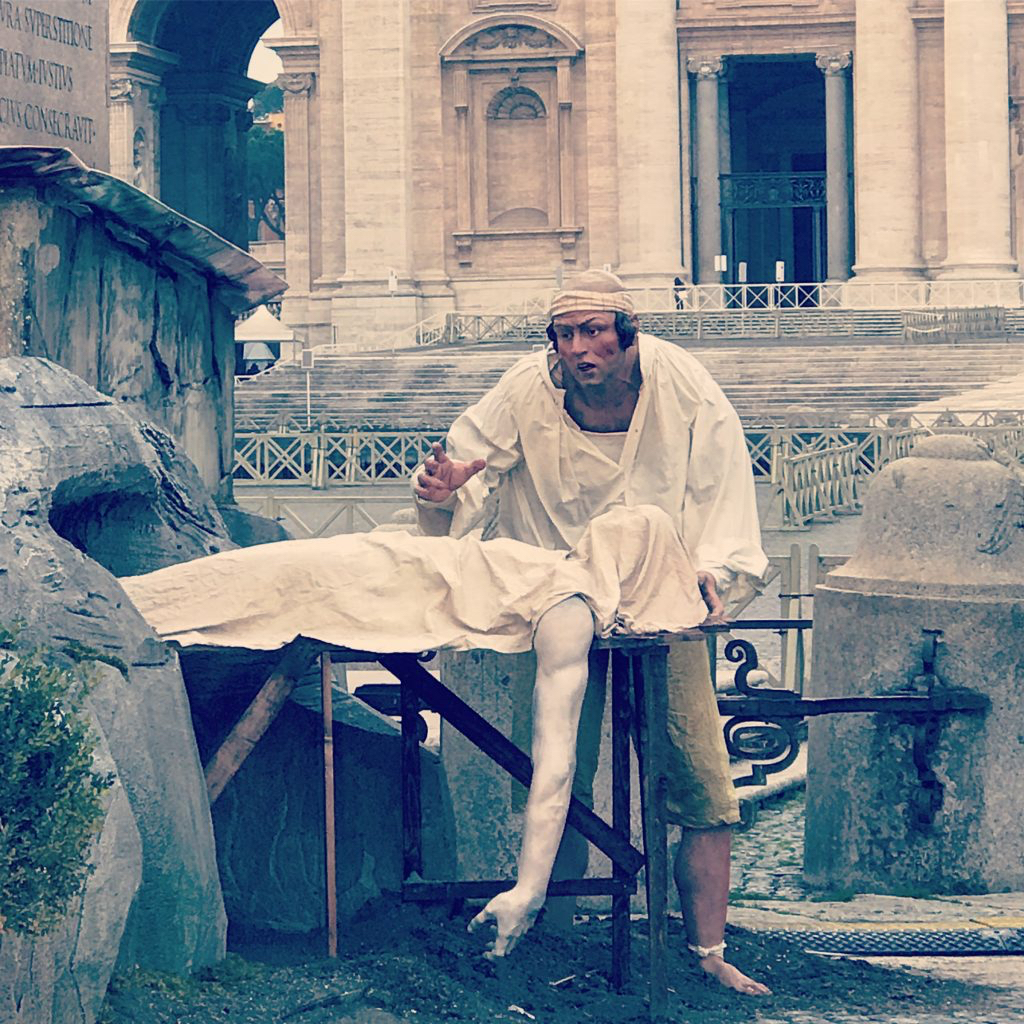Before Christmas I posted my critique of the Vatican nativity scene. You can read it here if you want, but my main point was not to get huffy about the naked man or the poor quality of the art so much as the fact that the corporal works of mercy were overshadowing the Nativity.
Simcha Fisher and a few others got the wrong end of the stick and jumped to the conclusion that I was somehow down on the corporal works of mercy.
Of course I’m not discouraging the corporal works of mercy, but pointing out that there is a question of priorities.
Jesus says there are two commandments: “The greatest commandment is love your God with all you heart, soul, mind and strength. The second is like, namely this, you shall love your neighbor as yourself.”
Both are necessary, but one is first and the other is second, and it is not being paranoid or hyper critical to point out that one of the main problems in the Christian Church today (both Catholic and Protestant) is the tendency to put the second commandment before the first–and even to forget the first completely.
Pope Francis himself has warned of this saying we should remember that the Church is not just another NGO. In other words, the Church is not primarily a social welfare institution, and the gospel is not primarily about the corporal works of mercy.
Does that mean we’re opposed to the corporal works of mercy? Of course not, and anyone who jumps to that conclusion is either not thinking things through completely or is being mischievous.
Why is it important to be sensitive to the tendency to put love of neighbor before love of God? Because, as I said in my post, we end up with what I call neo-Pelagianism–a religion of good works.
Yes, yes, I know “Faith without works is dead.” but why do we never hear “Works without Faith is dead?”
Finally, this issue is not simply a matter of theology, but also ecclesiology. A priest’s calling is to administer, teach and sanctify. While there are some priests who also have a special calling to the corporal works of mercy, and every Christian (including priests) are called to be personally involved in corporal works of mercy, it is the laypeople’s vocation (amongst many other things) to be the main active agents of the church’s corporal works of mercy in the world.
Now please don’t jump to conclusions and get all huffy and say, “Ooh, Father thinks priests don’t have to help poor people!” I’m not saying that. I’m pointing out that priests can’t (and shouldn’t) do everything. Instead, they inspire, oversee, assist, encourage and lead the people of God to exercise the corporal works of mercy in the world.
In our parish, for example, we have an active food pantry, St Vincent dePaul Society and Mother Teresa House health and referral center. The laypeople run these ministries. I support and encourage and oversee the work with them, but this is their work for the church and for the world.
The priest preaches the gospel, teaches the truth, celebrates the sacraments and so leads in the first commandment–the love of God. The people respond by being active agents of grace in the world in their own way. It is not either or. It’s both-and.







Maybe I’m wrong on this but in my experience it seems that people took the Vatican II documents to mean that the layity interfer with priestly duties instead of doing what the layity is suppose to do.
“This council exhorts Christians, as citizens of two cities, to strive to discharge their earthly duties conscientiously and in response to the Gospel spirit. They are mistaken who, knowing that we have here no abiding city but seek one which is to come, think that they may therefore shirk their earthly responsibilities. For they are forgetting that by the faith itself they are more obliged than ever to measure up to these duties, each according to his proper vocation. Nor, on the contrary, are they any less wide of the mark who think that religion consists in acts of worship alone and in the discharge of certain moral obligations, and who imagine they can plunge themselves into earthly affairs in such a way as to imply that these are altogether divorced from the religious life. This split between the faith which many profess and their daily lives deserves to be counted among the more serious errors of our age. . . . The Christian who neglects his temporal duties, neglects his duties toward his neighbor and even God, and jeopardizes his eternal salvation. (GS 43, emphasis added).”
http://www.ignatiusinsight.com/features2006/colson_rolelaity1_oct06.asp
G.K. Chesterton once observed that the process of “discovering” the Catholic Faith is most enjoyable, “easier than joining the Catholic Church and much easier than trying to live the Catholic life.”
How true. Living the Catholic life is tough but what else would one expect based upon the prize in the end. Maybe if we kept the end in mind more often, we would become imitators of our Blessed Mother. Isn’t this what she always contemplated? We don’t contemplate God enough. I guess it’s time to get the Rosary out and start contemplating.
And it wouldn’t hurt for us to pray for each other also.
Merry Christmas
Oh, I have to add the following from the article:
And while Vatican II and the 1983 Code of Canon Law allowed, in cases of serious need, lay involvement in such acts as distributing Holy Communion, such involvement instead became the norm and, in some parishes, a seemingly sacred right. For example, a priest recently told me about his experience while filling in at Mass at a local parish. A few minutes prior to Mass the priest was approached by a layman who matter-of-factly stated that he was the “Eucharistic minister” and would be up at the altar with the priest. When the priest flatly told him that he was not, in fact, a “Eucharist minister”–only the priest can claim such a title–and that he would not be needed (since the parish was fairly small), the man left in fit of anger!
Thank you!!